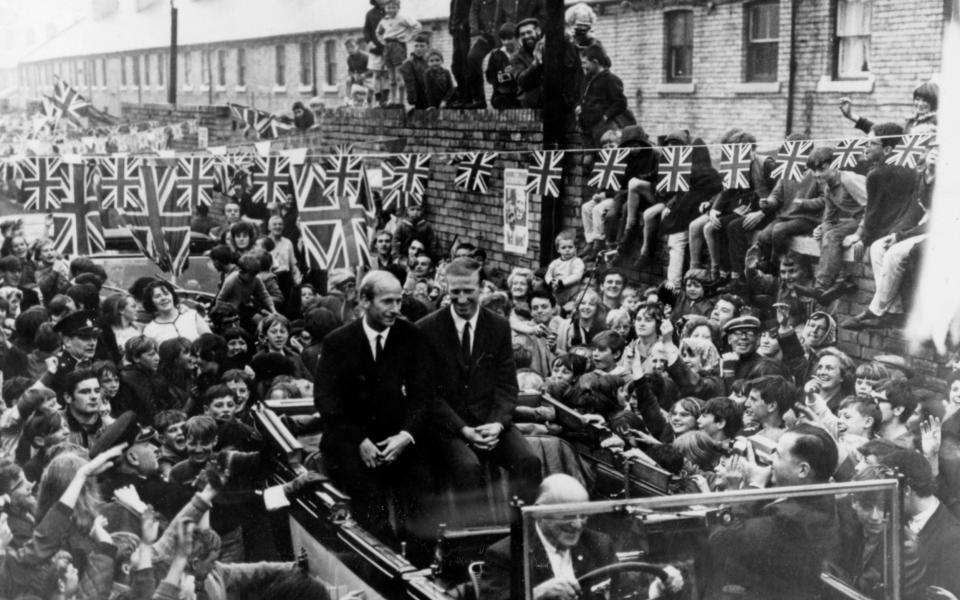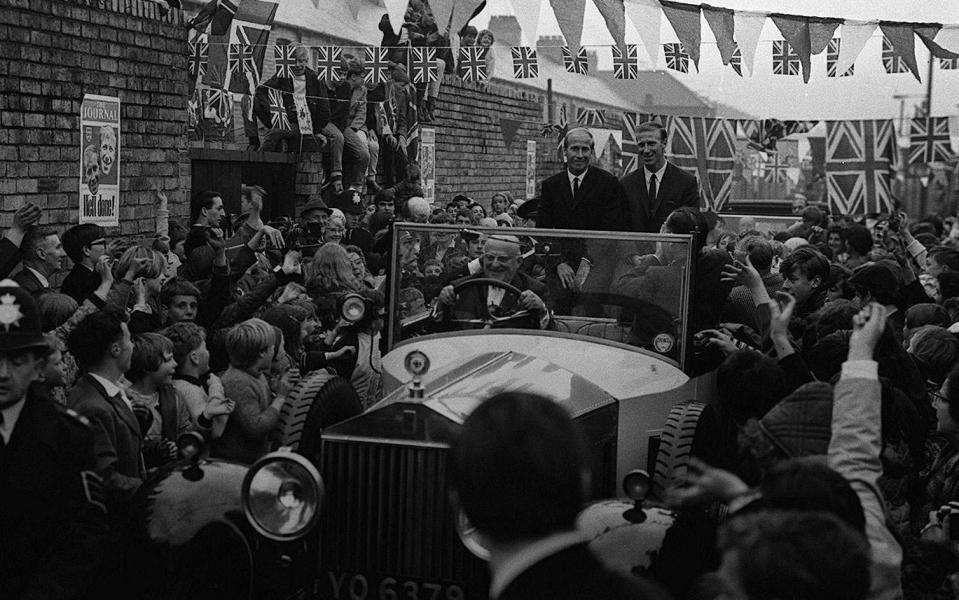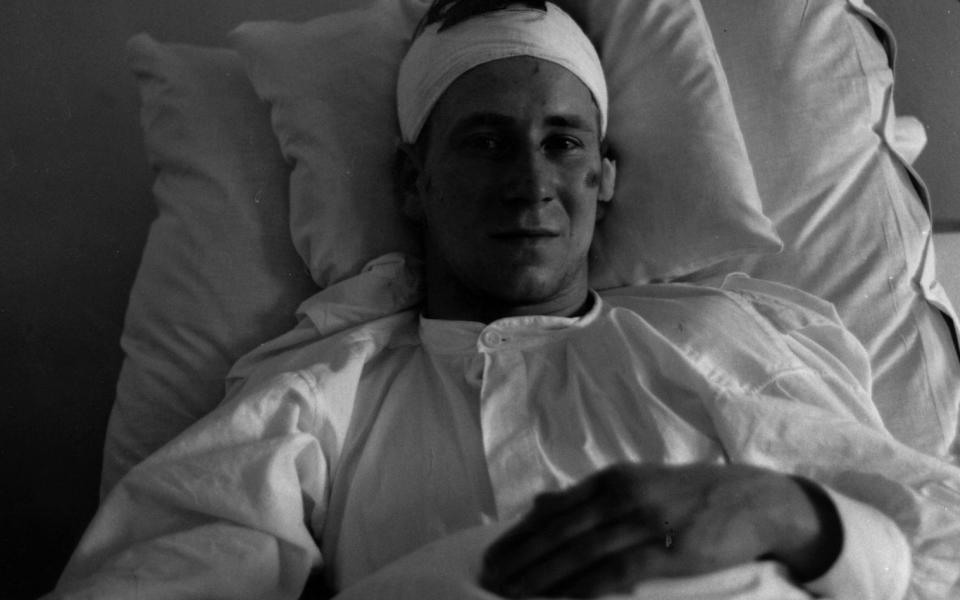Bobby and Jack Charlton’s relationship was tense – but brotherly bond was unbreakable

It was, said the late Sir Bobby Charlton, “the proudest moment that any of us ever had”.
English football’s greatest player was not talking about winning the 1966 World Cup at Wembley Stadium but the subsequent homecoming through the mining town of Ashington where he had grown up in No.114 Beatrice Street.
Remarkably, Sir Bobby had not just shared a bed with older brother Jack throughout his childhood they were also then united in the same team of 11 men for arguably England’s greatest sporting achievement. A civic reception, starting with a joint procession in an open topped Rolls Royce, was supposed to begin at 6.15pm on August 18 but, by mid afternoon, the streets were already packed thick with thousands of people. Sidney Sterck, writing in Newcastle’s Evening Chronicle, vividly described the scene: “The bunting, the flags and the portraits of the brothers had gone up all along what resembled a ‘royal’ route – on lamp standards, in windows, across the terraces and along the town’s main street.
“The door of the Charltons’ house was garlanded with flowers and topped with pictures of the footballing brothers. Youngsters wore paper hats, sucked ice cream, kicked footballs, and carried ‘Welcome’ placards above their heads.
“As the time for the procession neared, there were shouts of ‘We want Bobby’ and counter calls of ‘We want Jackie’. There were resounding cheers. ‘Reminds me of VE Day’, said a bystander.”
The photographs - with the two Charlton boys immaculately suited for the day - only enhance the narrative, and the fascinating finer details of the brothers’ upbringing in Ashington remain crucial to understanding an extraordinary family story.


Their old terraced house opened straight onto the street and it was in these narrow roads, especially the walled rear, that they would hone their football skills. Jack and Bobby were the eldest of four children - Gordon and Tom would later follow - and the North Eastern winters were so cold that the brothers would argue over who slept in the warmest middle spot of their double bed in what was two-up two-down accommodation.
Their father, Bob, was a coal miner but it was their mother, Cissie - the cousin of Newcastle United legend Jackie Milburn - who inspired their love of football. She wanted to play herself but women were banned at that time from the national sport. Cissie, though, would later coach at a local school in Ashington and, like a Judy Murray of her time, was hands-on in helping to hone her childrens’ skills.
“The only thing you played in Ashington was football,” recalled Jack, during a revealing appearance on BBC’s Desert Island Discs, who said that the basic choice for boys in the North East was a life down the pit or a shot at glory on the green grass.
For Bobby, who was much happier at home than an older brother who already loved fishing in the countryside, football stardom was rarely in doubt. Scouts from just about all the leading clubs were desperate to sign him when he chose Manchester United at the age of 15.
One of the original ‘Busby Babes’, Bobby won his first league title with Manchester United in 1957 and became a full England international in 1958, aged 20, only two months after the Munich air disaster.
Jack would follow a much slower football trajectory and there was also a stark contrast in their personalities. Like their mother Cissie, Jack was always more outwardly extrovert and differences in their character traits would only widen after Munich.
In his autobiography, Jack said that, “Robert was never the same lad to me after Munich…I saw a big change in our kid… he stopped smiling”.

Their younger brother, Tom, thinks that Sir Bobby had experienced survivors’ guilt. Jack briefly followed their father in working down a pit and, after two years’ national service, would forge a highly successful club career with Leeds United that began in the old Second Division. Differences in the brothers’ playing style were also pronounced. While Bobby’s two-footed creative skills have come to be revered all over the world, Jack was an aggressive, uncompromising and physical defender. Sir Alf Ramsey understood the need for a blend in his team and, to the surprise even of Jack, he was selected in the England squad shortly before his 30th birthday in 1965. Jack only found out about the call up a few minutes after Leeds had beaten Manchester United in the FA Cup semi-final and walked straight into the opposition dressing-room to make sure that Bobby was the first person to hear the news.
He would later draw a curt, if revealing, explanation from Ramsey when he asked the England manager why he had been selected. “I don’t always pick the best players,” Ramsey replied.
What Jack and Bobby then shared the following year for England will of course never be forgotten but there are several lesser known quirks of the summer of 1966 which are worth repeating. When Bobby scored twice to down Eusebio’s Portugal in the semi-final, the BBC actually replayed evening highlights of the match after learning that their father had missed the match because he had been working that afternoon down Linton Colliery.

Jack then bought their parents a larger new home in Ashington (including a first bathroom) with the winners’ £1,000 bonus that all the England players received and, despite remaining so indelibly interconnected, the brothers’ lives would drift apart. Jack achieved considerable success as a manager. It was a profession that did not seem to suit Bobby and he lived a relatively quiet day-to-day life in Cheshire despite remaining such a legendary and influential figure in the Manchester United directors’ box, especially during the tenure of Sir Alex Ferguson, who he would steadfastly support and describe above even Sir Matt Busby as football’s greatest manager.
Jack wondered if they would have been closer had they shared the ups and downs of management before revealing family tensions following the death of Cissie in 1996. The two brothers had helped carry their mother’s coffin at the funeral but Jack would then accuse Bobby of failing to come back home to visit in the years before her death. A rift between Sir Bobby’s wife, Lady Norma and Cissie, had been exposed. “There was a clash and it just never went away really,” Bobby would later write. “Jack came out in the newspapers saying things about my wife that were absolutely disgraceful. I don’t understand why he did it.”
Some wider context, however, is important. Jack’s style was always to bluntly speak his mind. Any consequences rarely really altered his thinking and, while they both clearly felt let down by the other, would still see each other quite happily at various events. Even after acknowledging a damage to their relationship on Desert Island Discs, Jack stressed, “he’s still our kid, he’s still my brother” and his son, John, was disappointed following his father’s death in 2020 at claims of lingering animosity. He stressed that Jack’s wife, his mother Pat, still speaks regularly to Lady Norma. “There is no issue,” said John. “They [Bobby and Jack] were as different as chalk and cheese. Dad liked going fishing with his mates, but Bobby wasn’t into fishing and did whatever he wanted. There is nothing wrong with that.
“Of course they had rows like any other brothers over different things but to say they stopped talking to each other was just not true. In the years before Jack’s death they often spoke on the phone. They also met at different football matches and functions. They just spoke to each other and got on with it. There was no feud.”
In the excellent 2020 documentary Finding Jack Charlton, John did also express hope that there would be a more obvious “happy ending” between what he described as “two stubborn people”. But it was much too late by then. Both men had already been diagnosed with dementia, but the wider public were left with a particularly moving final major appearance together.
It came when Sir Bobby was invited in 2008 to receive the BBC’s Sports Personality of the Year Lifetime Award. The identity of the person making the presentation had been kept secret but it was Jack Charlton waiting among other members of the England 1966 World Cup winning squad. And his big brother’s words that day now carry an especially poignant resonance. “When we were kids, and we used to go to the park and play, I would go home for dinner and he would stay on all day,” said Jack, before adding: “Bobby Charlton is the greatest player I have ever seen…and he’s my brother.”

 Yahoo Sport
Yahoo Sport 





































